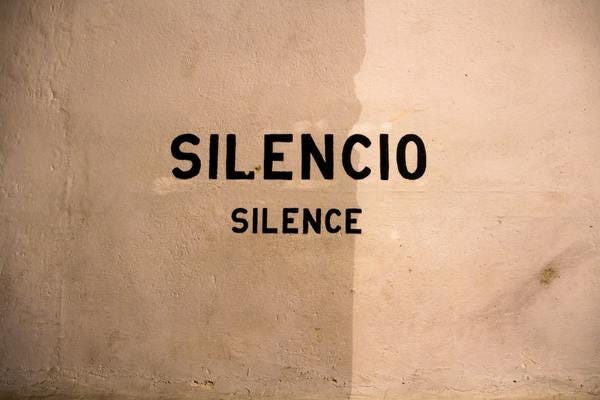The Lectio Letter - Issue #7 - Why a Silent Saturday?
Welcome to issue #7 of the Lectio Letter.
Once again, I’m publishing this normally members-only newsletter more publically. The usual members-only newsletter will operate again from next week.
If you’ve accessed this publicly, you can sign up to the Lectio Letter here and access the archives here which so far has included issues on ’being Spiritual’, ’COVID-19’ and ’Sin and Shame’.
In this COVID season where many of us are more alone than we have been in a long time, a season that is marked by waiting, we might be particularly attuned to the space offered to us by the Christian tradition of observing Holy and Silent Saturday, space for us to hold before God the things not yet made fully alive.
Why a Silent Saturday?
Why does Holy Saturday exist? Theologically it does not seem to contribute anything when placed alongside the crucifixion and resurrection. If God was trying to get the job done through Jesus, surely He could have confirmed his public death, and then momentarily resurrected Him. Why a whole day where seemingly nothing takes place?
I was the Crowd…
If Good Friday was the crescendo of our lenten wilderness’, then Holy Saturday is the last breath of silence, in musical notation, a fermata.
The same crowd that gathered around Jesus’ preaching, shouted Hosanna! on Monday.
This same crowd intoxicated by their opportunity to move the hand of Rome through their screams of “Crucify!” all fall silent today.
Silent Saturday reminds us of the purpose of solitude and silence as a Christian practise, to unveil the plastic inner dialogues of our lives and return to the ground of reality in the presence of God.
In silence, we run back over what has taken place, what has gone on. We are forced to recognise in silence our failures and our inability to go back. We realise we were the ones naively proclaiming Hosanna, and we are the ones, when we realise Jesus isn’t here to deliver us a quick-fix Kingdom, shouting Crucify.
We are Peter who brushes off our affiliation with Jesus when it protects us. We are Pilate confronted by questions we can’t answer, wanting proof we will never get, making decisions that are not ideal, but just the way things are. What is truth after all?
Sitting in Silence
As those with hurried inner lives, we want to fill the silence of Holy Saturday. Just as when someone dies suddenly in our own lives, people sit together united in their dumbfoundedness. About 5 years ago someone we knew in Masiphumelele, where we work, died suddenly.
Everyone, it seemed, raced incessantly to attach meaning to it. But even the meekest attempts to unpack some form of meaning to the tragedy of death feels irreverant, unhelpful and wrong. All our elaborate schemes to narrate our lives are unveiled when we experience death and we are, rightly, left in empty silence.
In our rush to affirm that God speaks today, we can inadvertently insist that he is some kind of blabbermouth that in fact never stops speaking. This is surely the result of what Voltaire described when he said
“If God has made us in his image, we have returned him the favour.”
But Holy Saturday insists that God is silent. Silent to our demands of meaning, Christ did really die, and to all those on the first Holy Saturday, all is lost.
Dwelling in this silent Saturday is a space in God’s story that can help us enter our own reality. The ‘Now and Not Yet’ that Lent has been trying to train us to live in, is also found on silent Saturday.
Saturday is the time between death and resurrection. Although Christ, as we will celebrate tomorrow, has initiated the new creation in his resurrection, we continue to wait, in patient faithfulness for the resurrection of all things (Romans 8:22-25).
So in this Holy, silent saturday, we join the psalmist in Psalm 13;
How long, O LORD ? Will you forget me forever?
How long will you hide your face from me?
How long must I wrestle with my thoughts
and every day have sorrow in my heart?
How long will my enemy triumph over me?
Look on me and answer, O LORD my God.
Give light to my eyes, or I will sleep in death;
my enemy will say, “I have overcome him,”
and my foes will rejoice when I fall.
Holy Saturday is a space that trains us, as all of lent has been, in the central Christian discipline of waiting.
Our hope for making something happen are unravelled and we are left with an option to trust the silent God is present.
But yet, even in Christ’s death, the inaction and the silence, we can see a recovery of that ancient and foundational sabbath commandment and an echo of God’s action in creation to rest.
Jesus observes the ultimate sabbath as he lays in the tomb. We wait and trust in silence while the King sleeps.
As James Hanvey says;
Holy Saturday is his time.
It is the time when we learn to trust his sacrifice of love which death can neither subjugate nor comprehend.
In Holy Saturday we begin to see that it is he who has made death his instrument; not to terrorise us into submission, but to call us more intimately to his side.
In the purifying darkness of Holy Saturday, we discover theSabbath of our waiting.
We come to the end of our way and the beginning of his.
It is only Christ who can carry us over into Easter morning, and so it is with all the Holy Saturdays of our life.
Pause and Reflect
Can you make some time today to find some silence and solitude? What are you waiting for? Spend time holding that before the Lord, trusting Him as He speaks or becoming aware of His presence, even in the silence.
Status Board
Work: Like many we are traversing a reality where in-person gatherings are fundamentally changing the way our existing projects have to proceed.
In good news, we are picking up where we left off with our Teleios participants having read Jamie Smith’s superb book “You are what you Love”.
Music
This last week, I’ve loved discovering this new record, iimini(Spotify), from Xhosa singer Bongeziwe Mabandla.
It was brilliant on the first listen and continues to grow on me. No need to understand Xhosa to appreciate the auditory aesthetics of this one.
Viewing:
We recently watched oscar nominated documentary Honeyland;
Hatidze lives with her ailing mother in the mountains of Macedonia, making a living cultivating honey using ancient beekeeping traditions. When an unruly family moves in next door, what at first seems like a balm for her solitude becomes a source of tension as they, too, want to practice beekeeping, while disregarding her advice.
What was set to be a heavy-handed ecological documentary is softened by the extraordinary beauty of the cinematography. The Macedonian film makers could not speak Turkish and so edited the film on mute giving it an extraordinary visual quality.
Food and Drink: Lockdown is creating lots of time, if not all needed ingredients to get creative in the culinary department.
These flourless and simple peanut butter cookies were introduced to us by Lori (two shout outs in one newsletter!) and have become a staple despite coming out a little different everytime;
Peanut Butter Cookies
1 egg
1 Cup Crunchy PB
1 tsp Baking Soda
½ cup oats
½ cup chocolate chips
splash of vanilla
Knead together, make in golf balls and then lightly flatten
Bake for 10 mins at 350F or 175c
Let them sit for 10mins, otherwise they simply fall apart.
Enjoy!
Grace and Peace until next time,
Liam





